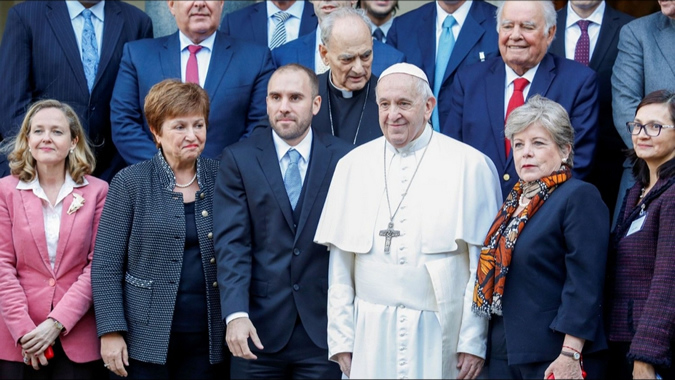Alicia Bárcena Calls for Strengthening Multilateralism to Confront a More Interconnected but also More Unequal World
ECLAC’s Executive Secretary participated today in the forum on New Forms of Solidarity, organized by the Pontifical Academy of Social Sciences, in which Pope Francis was the main speaker.

Financial liberalization and deregulation have made the world increasingly interconnected, interdependent, but also richer and much more unequal, affirmed Alicia Bárcena, Executive Secretary of the Economic Commission for Latin America and the Caribbean (ECLAC) at the forum on New Forms of Solidarity Towards Fraternal Inclusion, Integration and Innovation, organized by the Pontifical Academy of Social Sciences in Vatican City.
The United Nations high official participated in the high-level panel on Transforming the Rules of the International Financial Architecture: Economic and Financial Stability, along with Joseph Stiglitz, Nobel Prize in Economics; Kristalina Georgieva, Director of the International Monetary Fund; and Jeffrey Sachs, Director of the Center for Sustainable Development at Colombia University, in addition to other financial leaders and world economic specialists.
Also participating on panel were Ministers of Economy and Finance for Argentina, Martín Guzmán; Mexico, Arturo Herrera; Paraguay, Benigno López; El Salvador, María Luisa Hayem; and France, Bruno Le Maire. Nadia Calviño, Vice President and Minister of Economic Affairs and Digital Transformation for Spain, also took part.
The main speaker at the event was Pope Francis, who in his speech called for defeating the globalization of indifference and encouraging humanizing socio-economic mechanisms for society as a whole.
During her remarks, Alicia Bárcena stated that financial instability has become more frequent, systemic and involves greater responsibility for developed countries.
“In other words, the current economic situation reflects a process of globalization over the last three decades, and this is why we all feel very frustrated,” she expressed.
By way of example, she pointed out that in 1980 the value of world financial assets and GDP were similar (13 and 11.1 trillion dollars), while in 2016, the value of world assets was approximately 14 times world GDP (1.102 and 78 trillion dollars, respectively).
“We have a problem which is the uncoupling of the financial system from the real economy,” warned ECLAC’s Executive Secretary.
She made the point that the impact of the integration of countries in the international financial system has been segmented in the sense that it has happened according to level of risk and market size, and therefore, those who have ended up at risk are the countries of the center and periphery.
She added that, since of the crisis of 2008, the efforts to reactivate advanced economies have not had the expected impact and today, the world is facing a fall in trade, a slowdown in investment growth and lower productivity.
Alicia Bárcena warned that the concentration of economic power has accentuated the existing asymmetries with respect to the autonomy of different actors to be able to formulate policies.
“Developing countries have opened their economies. We opened our economies to financial institutions to try to attract capital and technical expertise, but our economies are substantially smaller than those of advanced countries and we have become more vulnerable to small portfolio decisions in advanced countries,” she asserted.
She specified that this asymmetry means that counter-cyclical policies are always an available policy.
The problem is that, for developing countries who are debtors or borrowers, the adjustment is mandatory; however, for lenders or developed countries, the adjustment is voluntary. That is a major asymmetry, she explained.
“We have to reform capitalism, definitively. We need multilateralism. We have the institutions, the leadership, we need coalitions. These new forms of solidarity are what the world needs, to think, to be together, to form coalitions,” she concluded.
In the framework of the event, ECLAC’s Deputy Executive Secretary, Mario Cimoli, also participated, addressing his remarks at how to restructure the bridge between the financial economy and the real economy, and what space there is for inclusive industrial policies.
Country(ies)
- European Union
- Latin America and the Caribbean
Contact
Public Information Unit
- prensa@cepal.org
- (56 2) 2210 2040